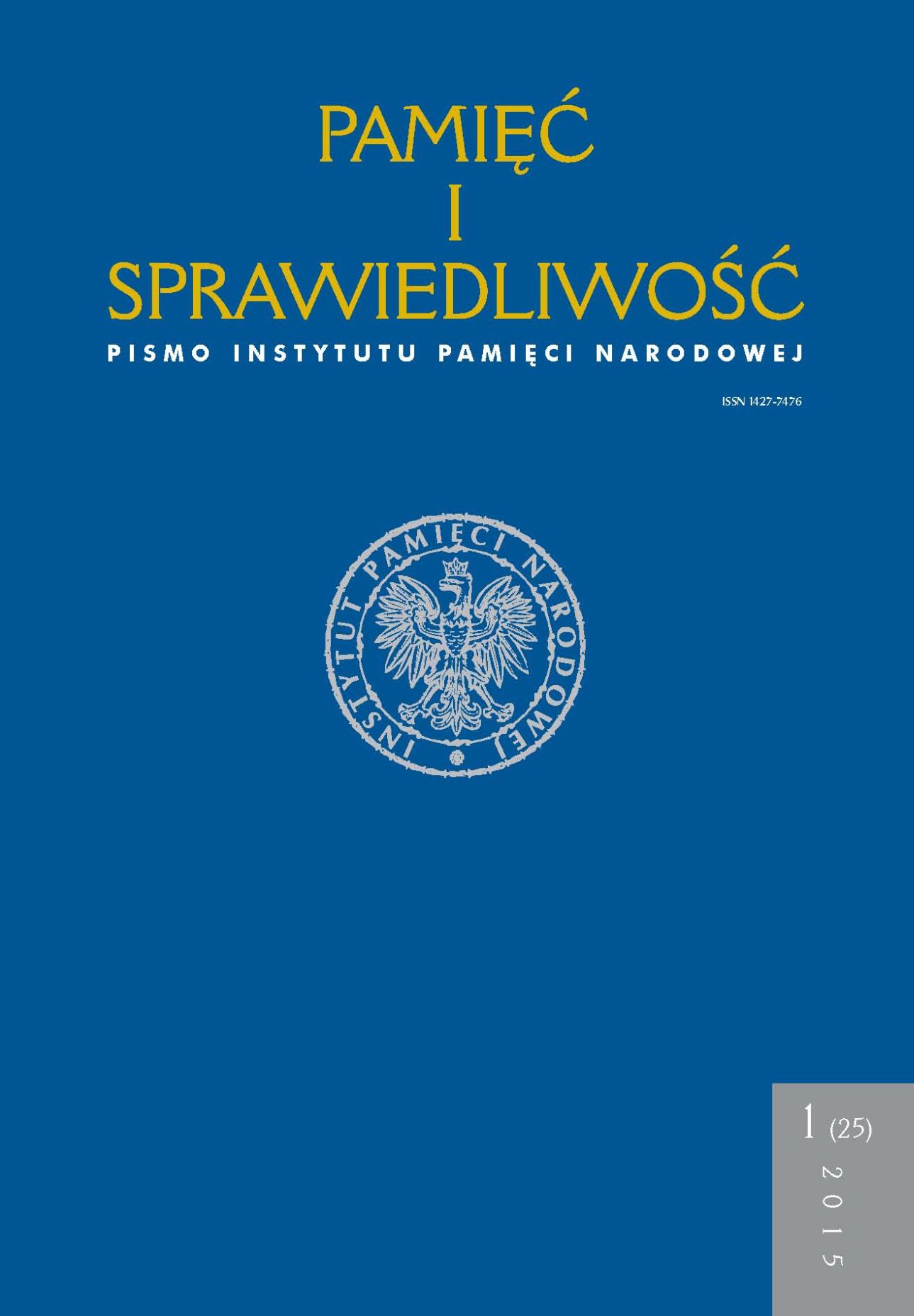Kultury powojenne. Sztuka i komunizm w Krakowie i Lipsku
Pamięć i Sprawiedliwość, Tom 25 Nr 1 (2015), strony: 163-184
Data publikacji: 2015-06-30
Abstrakt
Słowa kluczowe
Kraków • Lipsk • sowietyzacja • polityka kulturalna • związki artystów • rekonstrukcja • II wojna światowa • blok sowiecki Krakow • Leipzig • Sovietization • cultural policy • artists’ unions • reconstruction • World War II • Soviet Bloc
Bibliografia
- Stanisław Dobrowolski, Bolesław Drobner jakiego znałem [w:] M. Śliwa, Bolesław Drobner. Szkic o działalności politycznej, Kraków 1984
- Jan Tomasz Gross, Social Consequences of War. Preliminaries to the Study of Imposition of Communist Regimes in East Central Europe, „East European Politics and Societies” 1989, nr 2, s. 198-214
- Hough Seton-Watson, The East European Revolution, London 1950
- Zbigniew Brzeziński, The Soviet Bloc, Unity and Conflict, New York 1961
- Richard V. Burks, The Dynamics of Communism in Eastern Europe, Princeton 1961
- Norman Naimark, The Russians in Germany. A History of the Soviet Zone of Occupation, 1945–1949, Cambridge 1995
- Jan Foitzik, Sowjetische Militäradministration in Deutschland. Struktur und Funktion, 1945–1949, Berlin, Akademie Verlag, 1999
- T. Volokitina, G. Murashko, A. Noskova, T. Pokivailova, Moskva i vostochnaia Evropa. Stanovlenie politicheskikh rezhimov sovetskogo tipa (1949–1953). Ocherki istorii, Moskwa, Rosspen, 2002
- Norman Naimark, Leonid Gibianskii, The Establishment of Communist Regimes in Eastern Europe, 1944–1949, Boulder, Westview Press, 1997
- Corey Ross, Constructing Socialism at the Grass-Roots. The Transformation of East Germany, 1945–1965, London 2000
- Gareth Pritchard, The Making of the GDR, 1945–53. From Antifascism to Stalinism, Manchester, Manchester University Press, 2000
- Padraic Kenney, Budowanie Polski Ludowej. Robotnicy a komuniści 1945–1990, Warszawa, Wydawnictwo W.A.B. - Grupa Wydawnicza Foksal, 2015
- Laurie Koloski, Painting Kraków Red. Politics and Culture in Postwar Poland, 1945–1950, Stanford University 1998
- Anne Applebaum, Iron Curtain. The Crushing of Eastern Europe, 1944–1956, New York, Allen Lane, 2012
- John Conelly, Zniewolony Uniwersytet. Sowietyzacja szkolnictwa wyższego w Niemczech Wschodnich, Czechach i Polsce 1945–1956, Warszawa, Instytut Historii Nauki im. Ludwika i Aleksandra Birkenmajerów Polskiej Akademii Nauk : Oficyna Wydawnicza Aspra-JR, 2014
- Jan Behrends, Die erfundene Freundschaft. Propaganda für die Sowjetunion in Polen und in der DDR, Köln 2006
- Bolesław Drobner. Wybór prac i artykułów, red. M. Chałubiński, Warszawa, Ksia̢żka i Wiedza, 1980
- Bolesław Drobner, Bezustanna walka, Warszawa, PIW, 1962–1967
- Wulf Kirsten, Apostel einer besseren Menschlichkeit. Der Expressionist Rudolf Hartig (1893–1962), Eggingen 2007
- Thomas Höpel, „Die Kunst dem Volke”. Städtische Kulturpolitik in Leipzig und Lyon 1945–1989, Leipzig, Leipziger Uni-Vlg, 2011
- Andrzej Chwalba, Dzieje Krakowa 5. Kraków w latach 1939–1945, Wydawnictwo Literackie, Kraków 2002
- Anna Cichopek, Pogrom Żydów w Krakowie. 11 sierpnia 1945 r., Warszawa, ŻIH, 2000
- Brigit Horn-Kolditz, Die Nacht, als der Feuertod vom Himmel stürzte. Leipzig, 4. Dezember 1943, Gudenberg-Gleichen, Wartberg-Verlag, 2003
- Ferdinand May, Die bösen und die guten Dinge. Ein Leben erzählt, Berlin, Verlag Neues Leben, 1978
- Thomas Ahbe, Michael Hoffmann, Hungern, Hamstern, Heiligabend. Leipziger erinnern sich an die Nachkriegszeit, Leipzig, Kiepenheuer, 1996
- Brigit Horn-Kolditz, Weiß du noch? Von Messeonkels, Muckefuck und ‘Goldenen’ Broilern. Geschichten und Episoden, Kassel 2006
- Andrzej Chwalba, Dzieje Krakowa 6. Kraków w latach 1945–1989, Kraków, Wydawnictwo Literackie, 2004
- Thomas Höpel, Von der Kunst- zur Kulturpolitik. Städtische Kulturpolitik in Deutschland und Frankreich 1918–1939, Stuttgart, Franz Steiner Verlag, 2007
- Wiesław Szymański, „Odrodzenie” i „Twórczość” w Krakowie (1945–1950), Wrocław-Kraków, Zakład Narodowy im. Ossolińskich,Wydawnictwo Polskiej Akademii Nauk, 1981
- Frank Heidenreich, Arbeiterkulturbewegung und Sozialdemokratie in Sachsen vor 1933, Köln 1995
- Diana Poskuta-Włodek, Trzy dekady z dziejów sceny. Teatr im. Juliusza Słowackiego w Krakowie w latach 1914–1945, Kraków, Teatr im. Juliusza Słowackiego, Księgarnia Akademicka, 2001
- Ralph Nünthel, UT Connewitz & Co. Kinogeschichte(n) aus Leipzig-Süd, Beucha, Sax-Verlag, 2004,
- Urszula Urban, Władza ludowa a literaci. Polityka władz wobec środowiska Związku Zawodowego Literatów Polskich 1947–1950, Warszawa, Dom Wydawniczy Elips, 2006
- Katherine Lebow, Unfinished Utopia. Nowa Huta, Stalinism, and Polish Society, 1949–56, Ithaca, Cornell University Press, 2013
- Annette Schuhmann, Kulturarbeit im Sozialistischen Betrieb. Gewerkschaftliche Erziehungspraxis in der SBZ-DDR 1946 bis 1970, Köln, Böhlau Verlag, 2006
- Piotr Piotrowski, In the Shadow of Yalta. Art and the Avant-Garde in Eastern Europe, 1945–1989, London, Reaktion Books, 2009
- Patryk Babiracki, Soviet Soft Power in Poland. Culture and the Making of Stalin’s New Empire, 1943–1957, Chapel Hill, The University of North Carolina Press, 2015
 Język Polski
Język Polski
 English
English
 Deutsch
Deutsch
 Français (France)
Français (France)
 Italiano
Italiano
 Русский
Русский


 PDF
PDF
